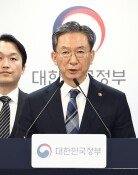Will The U.S. Hand Over Complete and Full Sovereignty?
Will The U.S. Hand Over Complete and Full Sovereignty?
Posted May. 30, 2004 22:43,
The United States and the United Nations were impudent right after the Iraqi Governing Council (IGC) named Iyad Allawi as Iraqs prime minister on May 28.
He was one of the candidates, said White House spokesman Scott McClellan after the announcement, saying. That wasnt what we had expected, but we will cooperate with him since the Iraqi people seem to agree, said UN spokesman Fred Eckhard.
However, as time goes by, the reaction of the US and UN shifted to Welcome. However, this reaction over the designation of the prime minister shows there seem to be psychological warfare among the Iraqi Governing Council, the United States, and the United Nations over the selection of Cabinet members of the IGC.
--The Iraqi Governing Council raises its voice
The Washington Post reported on May 30 that conflicts caused by the selection of a suitable person under the title, The Iraqi Governing Council is making a surprise attack on the U.S. and UN. Designating the President as a typical case. The Unites States and the United Nations support Adnan Pachachi, the former Sunni leader, but most of the IGC members are opposed. The White House prefers Pachachi, who is moderate and has a favorable attitude toward the West. However, the IGC support a Sunni leader, Ghazi al-Yawar, who is relatively less affected by the US.
There has been conflict when announcing the nomination of Prime Minister Allawi. Lakhdar Brahimi, the special UN envoy to Iraq, was supposed to make a final decision on the nominee for Prime Minister and announce it. At the beginning, he tried to nominate al-Chahristani for the Prime Minister, but it has been said that the political exile club of the IGC was against that. Brahimi, the special UN envoy to Iraq, said that We didnt intervene in it at all, and we were surprised when the nomination for the Prime Minister was announced.
--Same Bed, Different Dreams of the IGC, the US, and the UN.
Conflict has occurred like this because the players inner thoughts about the selection of cabinet members of the interim government are different.
The US doesnt give the IGC important rights, so that the government consists of what the US wants. However, the IGC wants to inform the public that they play a decisive role in order to escape from the situation under which the Iraqi people criticize them as betrayers.
The United Nations wants to compose the interim government with people who do not present political will, if possible. Lakhdar Brahimi, the special UN envoy to Iraq, thinks that the interim government should be neutral and that former bureaucrats should enter into the interim government constitution in order to prepare for the election. However, his plan conflicts with the position of the IGC that wants to largely include politicians.
Dong-Keun Keum gold@donga.com







